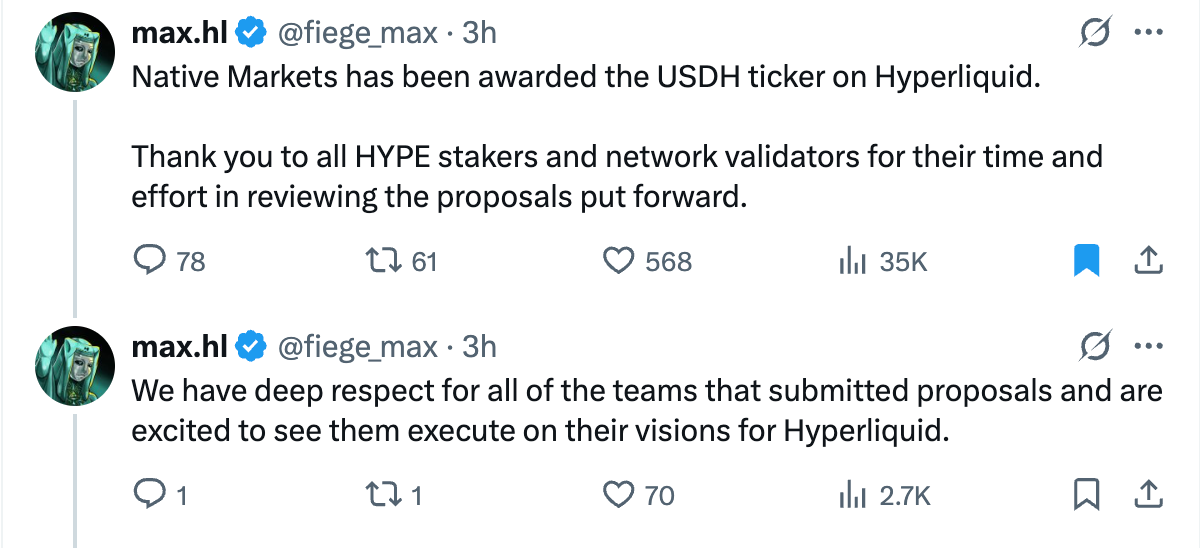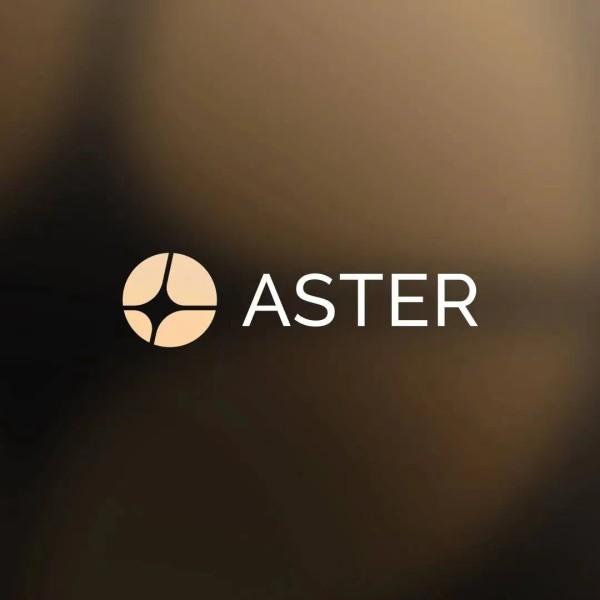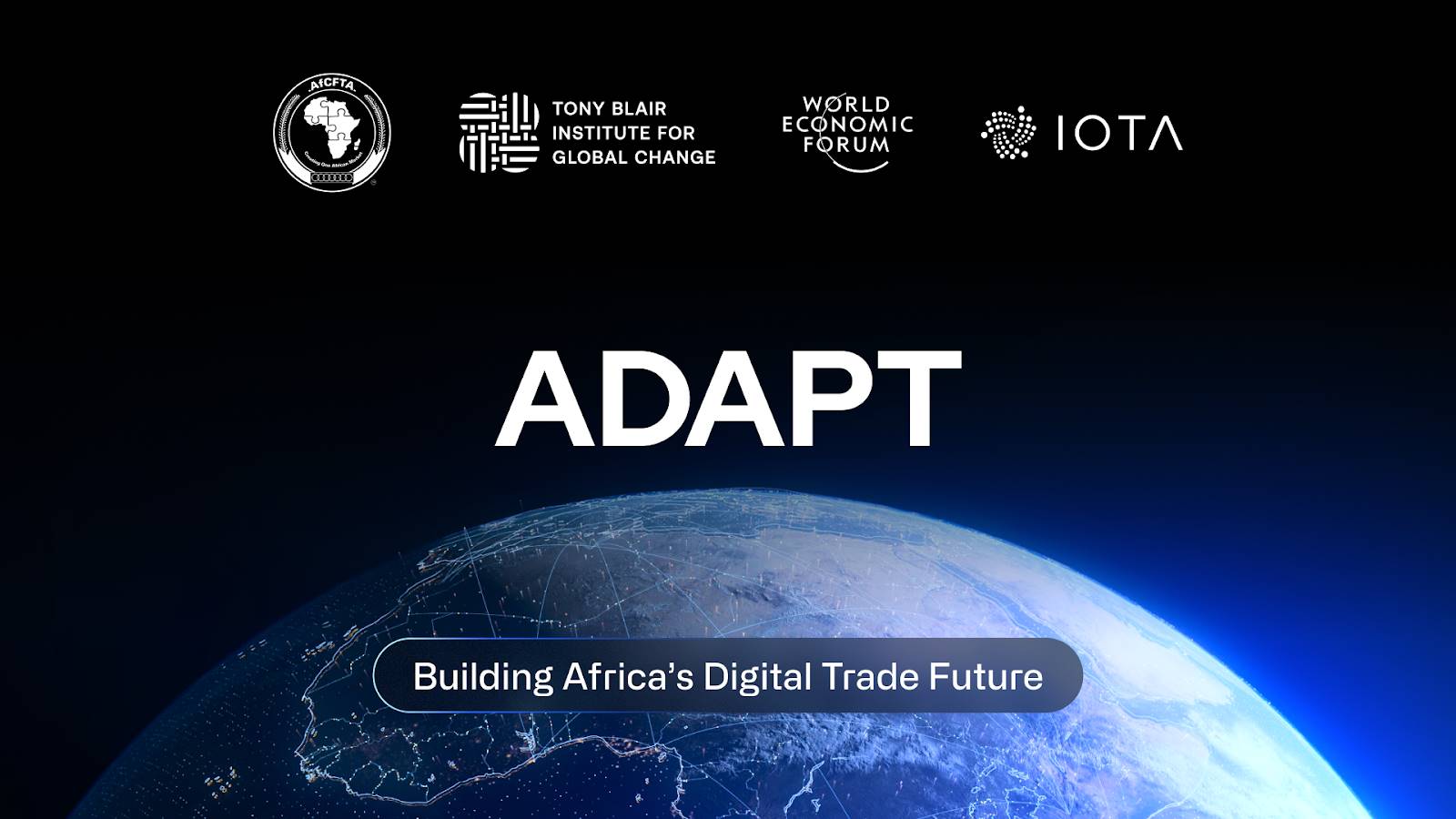Native Markets officially claims Hyperliquid's USDH stablecoin ticker
Native Markets, one of the teams that submitted a proposal to issue and manage the Hyperliquid crypto exchange’s US dollar stablecoin (USDH), officially claimed the USDH ticker on Sunday, following a community vote.
The project will deploy the inaugural Hyperliquid Improvement Proposal (HIP) for USDH and an ERC-20 token, the token standard for the Ethereum network, in the coming days, Max Fiege, founder of Native Markets, said in an X post . He also outlined the next steps:
“We will then start with a testing phase for mints and redeems of up to $800 per transaction with an initial group, to be followed by the opening of the USDH/USDC spot order book, as well as uncapped mints and redeems.”
Native Markets’ odds of winning the ticker spiked to over 99% on Saturday, on prediction market Polymarket, following synthetic stablecoin issuer Ethena’s withdrawal from the race on Thursday.
 Source: Max Fiege
Source: Max Fiege
The USDH bidding war was closely followed by the crypto community and industry executives, leading to accusations of a rigged selection process and reflections on the future of the stablecoin sector as a whole.
Hyperliquid’s USDH bidding war draws criticism and sparks debate
Crypto industry executives voiced mixed reactions to the USDH bidding process and the outcome of the vote, which saw established stablecoin, crypto, and payment firms lose out to a newcomer.
“Starting to feel like the USDH RFP was a bit of a farce,” Haseeb Qureshi, managing partner of venture capital firm Dragonfly, said on Tuesday.
“Hearing from multiple bidders that none of the validators are interested in considering anyone besides Native Markets. It's not even a serious discussion, as though there was a backroom deal already done,” Quershi added.
Mert Mumtaz, the CEO of remote procedure call (RPC) node provider Helius, said that the bidding war revealed that stablecoins have become commoditized.
Mumtaz speculated that US dollar stablecoin tickers will be abstracted away in the future, and exchanges will only display a generic “USD” to front-end users.
These exchanges will do all the work of swapping the differently denominated stablecoins behind the scenes, in a backend process that the user never sees or interacts with, Mumtaz concluded.
Disclaimer: The content of this article solely reflects the author's opinion and does not represent the platform in any capacity. This article is not intended to serve as a reference for making investment decisions.
You may also like
Aster announces a $10 million trading competition, combined with Stage 4 airdrop and Rocket Launch incentives, driving multi-layered growth in platform depth and liquidity.
After achieving strong performance in Stage 3, Stage 4 (Harvest) airdrop plan was launched, and the “Double Harvest” trading competition with a total reward of 10 million USD will be introduced on November 17.

Mars Morning News | Federal Reserve officials send strong hawkish signals again, December rate cut in doubt
The crypto market has generally declined, with bitcoin and ethereum prices falling and altcoins experiencing significant drops. Hawkish signals from the Federal Reserve have affected market sentiment, and multiple project tokens are about to be unlocked. Early ethereum investors have made substantial profits, and expectations for a continued gold bull market persist. Summary generated by Mars AI. The accuracy and completeness of this summary, generated by the Mars AI model, are still being iteratively improved.

IOTA collaborates on the ADAPT project: Building the future of digital trade in Africa together
IOTA is collaborating with the World Economic Forum and the Tony Blair Institute for Global Change on the ADAPT project. ADAPT is a pan-African digital trade initiative led by the African Continental Free Trade Area. Through digital public infrastructure, ADAPT connects identity, data, and finance to enable trusted, efficient, and inclusive trade across Africa.

